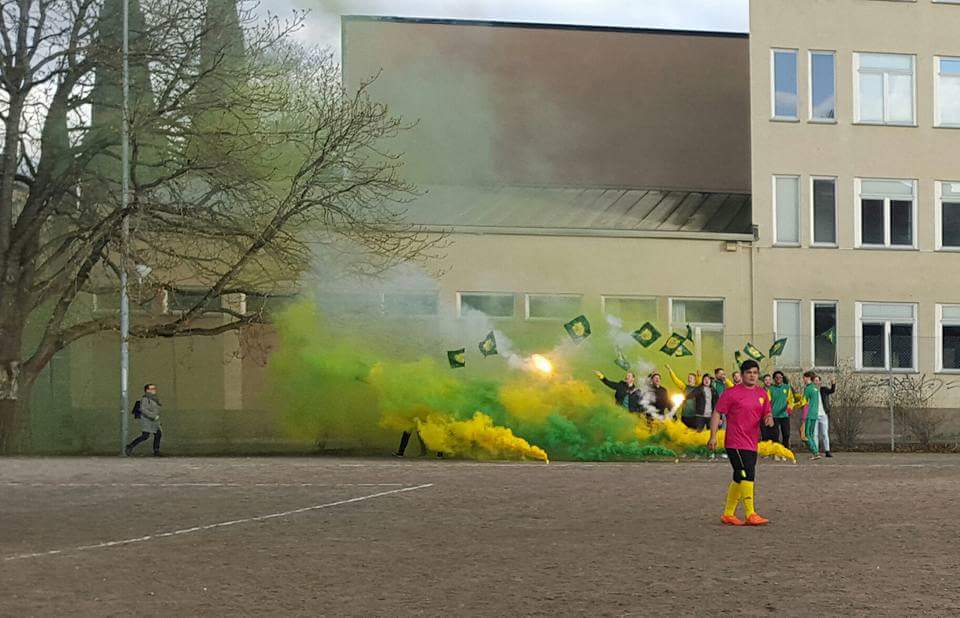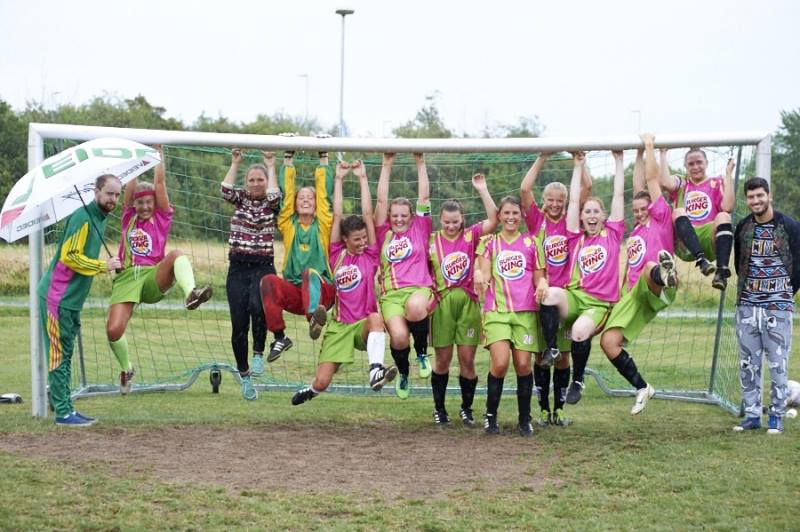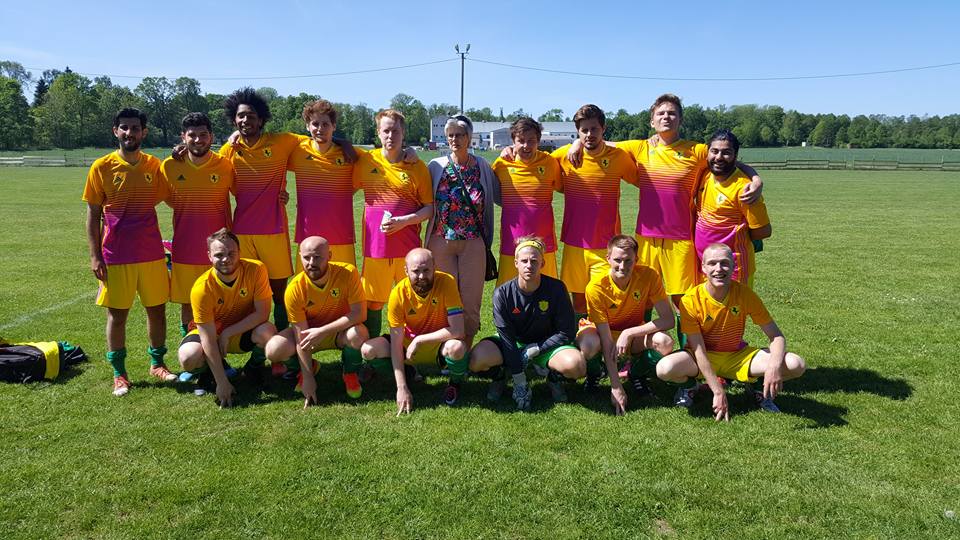ISUN: The Swedish school project-turned-football club helping teenage refugees
For most of us who have had to endure them, the mere mention of the arduous slog of school projects evokes a familiar response. Tedious, tiresome, dull. But what happens when you decide to create a sports club for that school project?
And what about if that same school project has ballooned into a fully fledged football club 12 years later to the point you decide to tattoo it onto your forearm?
A rarity — as some may recall from their own time in education — but this is the story of Leo Taub and Johannes Wunsche, two founding members of Swedish amateur football club ISUN, based in Uppsala.
Founded in 2007 by a group of school friends, ISUN are more than a football club. A family, they say on their Twitter, focused on having fun and spreading joy.
“Everybody does a project on something,” Johannes told the Sports Gazette. “And ours was to start this team. In the beginning it was floorball.” For those unaware, floorball is essentially indoor hockey, minus the ice.
Leo added: “We sucked at floorball, we lost every game in the first year. When we started playing football [in 2009] we realised we were better so we just went with it.”
The original aims, Johannes said, were simple; getting straight to the crux of why anybody ever begins playing a sport. “We heard that things at other clubs got too serious, so we wanted to start a team that was different and fun. There was no aim to help others, just to be fun and spread joy.”
“That’s the foundation,” he continued. “In the beginning, we didn’t even play football, it’s just one way to have something in common to do. For us it’s football. The main thing is to find something we all share then do something cool with it.”

“We played in something that was even lower than the league system. It was 7-a-side and you mostly play on gravel,” Leo explained. “Lots of people liked what we were doing and a lot of friends wanted to join, and we realised we had enough people to play in the proper league.”
By 2014, ISUN had a men’s 11-a-side team and they waved a sweet goodbye to the harsh surfaces of yesteryear, embracing grass. Now in the sixth tier of the Swedish pyramid — recently earning promotion — with over 100 members, this was never the intention. But word spread like wildfire and the club continued to expand.
Johannes said: “When we started the men’s team, that’s when we had our first big meeting and decided to be about spreading joy. We realised the platform could be good for more than just us having fun, so we started looking for other ways we could help the Uppsala community.”
This was the light bulb moment and ISUN began donating 10% of their membership fees to the Uppsala City Mission. Money isn’t the motive and staff members are volunteers. “We just do it because we’re family and we care about family,” Leo said.
As popularity grew, the requests flooded in. First, it was whether they had a women’s team, which they have had as of 2015. Then, a year later, the ISUN Flames initiative was born, helping teenage refugees arriving in Sweden without their parents.
“A teammate’s family had four guests living with them that were refugees,” Johannes — head coach of the Flames — said. “They wanted to play football and there were no teams reaching out to them that they could afford, so they asked if we could start one.”
He continued: “We put a post on Facebook and I got plenty of e-mails and phone calls. It was actually really easy getting a team going and we didn’t do much work to promote it.” Around 20 refugees turned up to the first team meeting.
It’s the positive power of social media at its finest. They needed balls, for example. Up goes a post on Facebook and balls they got. “People are really helpful because it’s a good thing to do,” Leo said.

The Flames are an amateur, 7-a-side team — yep, back to gravel — but the purpose is far more transcendental than football.
Winning? Irrelevant. The best players? Doesn’t matter. ISUN do encourage players to join better sides if they see potential — and they provide a stepping stone to do so — but helping refugees settle into Sweden is the priority, giving them a reliable, inclusive support network the purpose.
“It’s more to help them get to know Sweden,” Johannes said. “They can learn to speak Swedish and have something fun to do while other things in life might suck. Like when they’re applying for asylum, they can hang out and have fun. It’s more than just being good at football.” Fun, there’s that buzzword again.
He continued: “I think that they feel they have someone that’s rooting for them. Maybe they feel like Sweden don’t want them here, but they know we always have their back. We support them and help them.” Whether it be finding a home, a team or a lawyer, the Flames epitomise an all-for-one-one-for-all mentality.
“Football is a universal language,” Leo explained while acknowledging how cheesily cliched it sounds. But it’s true nonetheless. “You can go through some horrible times, but as soon as they’re on the pitch, there’s no difference between anyone.”
The relationship is synergistic, and just as much as ISUN help them, the Flames want to give back to both the club and the Uppsala community.
Leo said: “It’s their own ideas, they want to give to other people. That’s amazing to witness and be part of. It’s a really nice feeling to see them be so grateful and want to give back.”
For example, two members of the Flames are now involved on an administrative level, helping shape ISUN’s future, while they also collaborate with Gottsunda library in the ‘fairytale project.’
“The Flames read stories for the kids in Swedish and they learn the language,” Johannes explained. “The younger kids get to see a football player read for them. You make kids from different backgrounds feel that reading and the library is theirs as well.”

As the interview wound down, there was one elephant in the room that needed addressing. The tattoos on their forearms, permanent symbols of how much ISUN means to Leo and Johannes.
“We were talking about getting tattoos,” Leo explained. “We went to Denmark and we were having a bit of fun, daring each other like ‘if you do it, I’ll do it.'” They both did it.
“It makes me talk about the club always. I want to say things because I’m proud,” Johannes said. It’s about spreading joy, remember.
Leo was quick to second this notion. “People see it and they want to talk about it. You feel happy every time that happens, so I haven’t regretted it. It was the best money I’ve ever spent.”
Unlike your model of the solar system, this school project is here to stay and not just in tattoo form. In family, fun and joy, Leo and Johannes capture the essence of sport and cultivate its power to positively impact their local community. This is a club doing all the right things. All that remains now is qualifying for the Europa League, or so they joked.
Featured photograph/ISUN